
George V's Silver Jubilee and Pageant, 1935
The Jubilee coincided with the 700th anniversary of Winslow's market charter, and there was a combined celebration on 6 May.
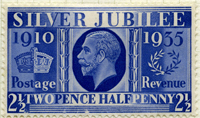 Click here to go directly to the main sections:
Click here to go directly to the main sections:
- United service
- Procession of decorated vehicles
- Sports
- Pageant: the granting of the market charter
- Bonfire and torchlight procession
Buckingham Advertiser, 11 May
Winslow Becomes a Wonderland
DAY OF PAGEANTRY: NIGHT OF BRILLIANCE
Remarkable Processions Through Town Streets
BEAUTIFUL SETTING FOR HISTORIC PAGEANT
MAYPOLE DANCING ON MARKET SQUARE
Nowhere, probably, in the whole county of Bucks was the Jubilee spirit more heartily in evidence than at Winslow and few towns of similar size can have produced and carried through with conspicuous success, a programme of festivities so enterprising, so novel or so well calculated to provide for the happiness of all concerned. From the start of the day’s events with the pealing of the bells of St. Laurence and the impressive united service on the Square, to the brilliant episodes of Jubilee night, the day was filled with happy events.
A remarkable procession of decorated vehicles, probably one of the best displays of its kind of any small country town in England on Jubilee day, passed through crowded streets. A luncheon for the old people, sports, and a tea for the children, preceded another memorable scene, the presentation on the Market Square of a pageant alive with past local romance and vivid with colour. A Maypole was erected on the Square and there were rounds of country dancing. A brilliant torch-light procession led the way to a great bon-fire around which the crowds joined in community singing. A free dance in the Odd Fellows’ Hall made a popular close to a splendid programme about which the participants were loud in their praise.
The general effect of the decorations of the buildings surrounding the Market Square was remarkably picturesque. The ornamentations of the “Bell” and the “George” added much to the old-world charm of the picture and the Bank and other business premises had been brilliantly adorned. The whole town, indeed, presented a thoroughly gay appearance and some of the owners of shopping establishments and private houses, large and small deserve a word of special praise, although it would be invidious to mention them by name. Prizes were offered for the best decorated premises and these were awarded as follows:-
Business premises- 1, Messrs. J. C. Hawley and Son; 2, Messrs. E. A. Illing and Sons.
Large houses and villas- 1, Mr. A. Walker; 2, Miss E. M. Pratt.
Small houses and cottages- 1, Mr. T. Wilson; 2, Mr. Frewen.
THE COMMITTEE.
The wholehearted way in which the people of Winslow, both on the day itself and by their financial and other practical support during the preparations, entered into the spirit of the occasion was responsible for the success of the celebrations. Added to this was the enterprising and tireless work of Mr. G. T. Bennett, Chairman of the Jubilee Committee, Sir Kenneth Macdonald, Secretary, Mr. E. W. Green, Assistant Secretary, all their numerous helpers including the following Committee:-
Representing Parish Council: Messrs. G. T. Bennett, T. H. Higgs, A. Meanwell, D. Low, A. J. Illing, E. W. Green, H. R. Langley, E. E. Byford, E. H. Sellar; Women’s Institute: Mrs. R. J. Haines; Oddfellows’ Society: Mr. H. Williams; British Legion: Mr. F. S. Young; Chamber of Trade: Mr. L. J. Hawley; Winslow School Managers: Miss Lambton and Mr. Geo. Ingram; elected at public meeting: the Hon. Ruth Hubbard, Mr. W. R. Monk, Mr. G. Pass, Mr. K. J. Robson, Mr. B. E. G. Woodman, Sir Kenneth M. Macdonald, Mr. Norman McCorquodale, the Rev. St. J. H. Beamish; the Rev. A. M. Lewin, the Rev. A. Gawler, Mrs. K. J. Robson.
The United Service held in the Market Square, was attended by a large and representative congregation.
The Vicar of Winslow and the two Free Church ministers of the town- the Rev. St. J. H. Beamish R.D., the Rev. A. M. Lewin (Congregational Church) and the Rev. A. Gawler (Baptist Church)- conducted the service. The first verse of “God save the King” was sung accompanied by the band, and followed by the hymn “City of God, how broad and far.”
The scriptural readings (Joshua I1,8.9. and Revelation XXI, 10, 11, 23, 24) were read by the Rev. A. M. Lewin and the Rev. A. Gawler. Prayers recited by the Rev. St. J. H. Beamish included the following in the official service:
It is very meet, right, and our bounden duty that we should give thanks unto thee, O Lord, Holy Father, Almighty, Everlasting God, for that Thou wast pleased as on this day to set Thy Servant our Sovereign Lord King George upon the throne of this Realm and hast protected him in days of sickness and of health throughout his reign of five and twenty years. For the example of unceasing service set by him and our gracious Queen Mary; for strength and steadfastness bestowed on him and on this Nation in years of war and of manifold anxieties; for the love and loyalty borne to him by a great family of peoples in all parts of the world, we laud and magnify thy glorious Name. We bless thee for increase in the knowledge of thy marvellous works, in care for those who suffer from sickness or the lack of work, in desire that all men everywhere may live in peace and enjoy the fruits of their labour. For these and all other thy mercies vouchsafed to us, O Father Almighty, we yield thee unfeigned thanks; through Jesus Christ our Lord, to whom with thee in the unity of the Holy Spirit be all honour and glory now and for evermore. Amen.
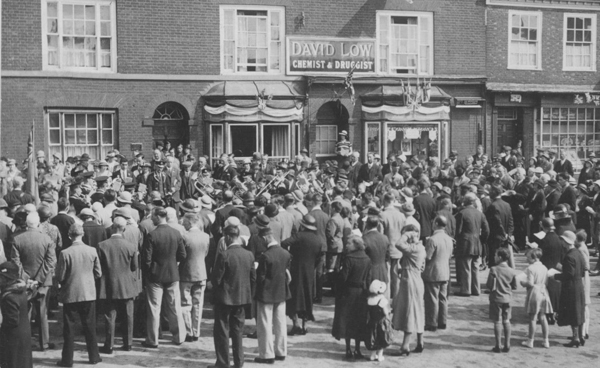
“O God of Jacob by whose hand” was sung this preceeding the following prayers by the Rev. A. M. Lewin:-
O God, who providest for thy people by thy power, and rulest over them in love; Vouchsafe so to bless thy servant our King, that under him this Nation may be wisely governed, and thy Church may serve thee in all goodly quietness; and grant that he being devoted to thee with his whole heart, and persevering in good works unto the end, may, by thy guidance, come to thine everlasting kingdom; through Jesus Christ thy Son our Lord, who liveth and reigneth with thee and the Holy Ghost, ever one God, world without end. Amen.
O Lord our God who upholdest and governest all things by the word of thy power; Receive our humble prayers for our Sovereign Lord, George, as on this day set over us by thy grace and providence to be our King; and, together with him, bless, we beseech thee, our gracious Queen Mary, Edward, Prince of Wales, and all the Royal Family; that they, ever trusting in thy goodness, protected by thy power, and crowned with thy gracious and endless favour, may long continue before thee in peace and safety, joy and honour, and after death may obtain everlasting life and glory; by the merits and mediation of Christ Jesus our Saviour, who with thee and the Holy Ghost liveth and reigneth ever one God, world without end. Amen.
Almighty God, who rulest in the kingdom of men, and hast given to our Sovereign Lord King George, a great dominion in all parts of the earth: Draw together, we pray thee, in true fellowship the men of divers races, languages, and customs, who dwell therein, that, bearing one another’s burdens, and working together in brotherly concord, they may fulfil the purpose of thy providence, and set forward thy everlasting kingdom. Pardon, we beseech thee, our sins and short-comings; keep far from us all selfishness and pride; and give us grace to employ thy good gifts of order and freedom to thy glory and the welfare of mankind; through Jesus Christ thy Son our Lord, to whom with thee and the Holy Ghost be all glory and dominion, world without end. Amen.
WINSLOW’S LOYAL MESSAGE.
The congregation recited the Lord’s Prayer, after which Mr. G. T. Bennett read the loyal expression from the people of Winslow (the illuminated lettering of which was the work of Mr. Chowles junr.) which had been sent to H.M. the King and H.M. the Queen. The following was the full text of the loyal message:
We, the citizens of the town of Winslow in the County of Buckingham, in this year of grace 1935, the seven hundredth anniversary of the granting of a Market Charter to our town by King Henry the Third, do respectfully beg to present our humble congratulations to Their Majesties our present beloved King and Queen, George the Fifth and Mary, on the happy occasion of their (Majesties) Silver Jubilee, and assure them of our deep loyalty and affection.
God save the King.
THE GLORIOUS DEAD
Cheers greeted the reading of the message, and then the last two verses of the National Anthem were sung. Mr. G. T. Bennett (Chairman of the Jubilee Committee) called for three cheers for H.M. the King and these were heartily given. The parade re-formed and marched to the War Memorial where Mr. Bennett laid a wreath.
The British Legion paraded under Sergeant Knight with Mr. Saunders (Standard Bearer), Waddesdon Prize Band accompanied the singing.
At the conclusion of the United Service in the Market Square everyone made tracks for Station Road Green to witness the judging of the decorated vehicles, etc. Winslow may be really proud of this feature of the celebrations for without doubt the display would have done credit to a much larger town. The entries exceeded all expectations, and there was good reason for sympathising with the judges in a most difficult task which they performed excellently. Hundreds of townspeople gathered round the station to witness a spectacle that Winslow has not seen for a long day. All who entered in the parade are to be congratulated on a wonderful display.
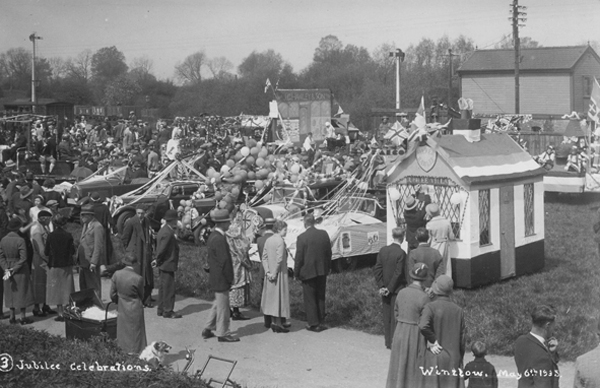
THE ENTRIES DESCRIBED.
It would be impossible to describe every entry, but we give a suggestion as to the interesting character of some of the numerous notable features.
Much amusement was caused by a three-wheeled motor car fitted up as a bed with two sleepers, Mr. G. A. Collings, the entrant, making sure of rising early for the bed was fitted with an alarm clock! “The Old Woman who lived in a Shoe” was cleverly depicted by Winslow P.A. Institution under the direction of Mr. H. Bradbury. The shoe was mounted on a lorry with the family grouped all round.
ANCIENT AND MODERN.
A striking contrast in past and present was seen in two entries from Winslow Fire Brigade who turned out with the old-fashioned manual drawn by horses with a barrel of beer on the rear and also a hen’s nest with eggs that had not been disturbed for a long period! [photo below] The other brilliantly decorated entry showed the modern fire-fighting appliances, with the firemen in smart up-to-date uniform. [scroll down for photo] The latter display was under the direction of Chief Officer Illing, supported by Second Officer Gibbard, Engineers R. French and W. French, Firemen Hawkins, Kerrison and Paintin and the first-mentioned entry was by the following members of the Winslow Fire Brigade, Messrs. J. Hobbs, B. Odell and W. French.
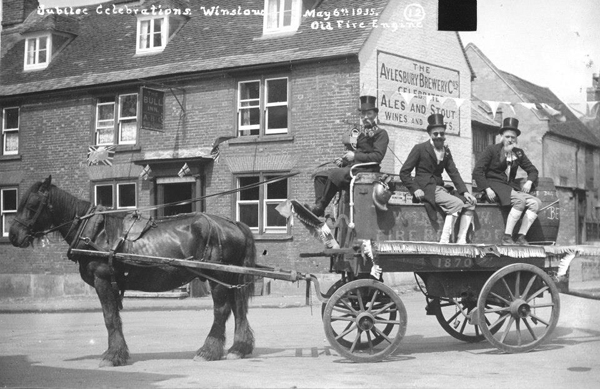
LEGION’S “DUG-OUT.”
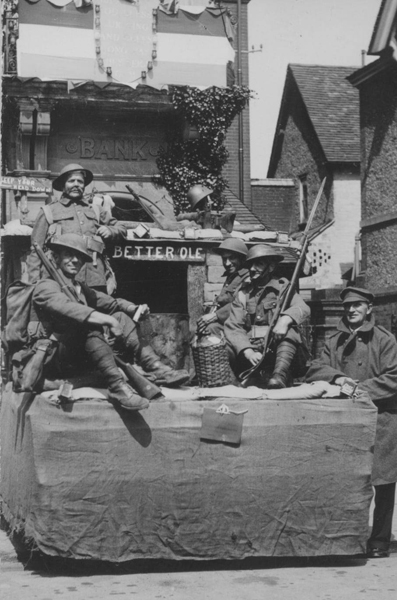 Another clever entry was from the Winslow British Legion, this depicting a dug-out “somewhere in France.” [photo, right] A notice at the top of the dug-out “Keep your head down” added to the realistic atmosphere. The members of the Legion in this exhibit were Messrs. G. H. Hudd, J. G. Boots, E. French and C. Brazier. An up-to-date and novel entry from the Winslow Motor Works was entitled “The Gertie Speedo.” Two policemen- Messrs. Cox and Illing- had charge of the speed cops’ car which was fitted with a gong, and a large speedometer affixed to the rear of the vehicle.
Another clever entry was from the Winslow British Legion, this depicting a dug-out “somewhere in France.” [photo, right] A notice at the top of the dug-out “Keep your head down” added to the realistic atmosphere. The members of the Legion in this exhibit were Messrs. G. H. Hudd, J. G. Boots, E. French and C. Brazier. An up-to-date and novel entry from the Winslow Motor Works was entitled “The Gertie Speedo.” Two policemen- Messrs. Cox and Illing- had charge of the speed cops’ car which was fitted with a gong, and a large speedometer affixed to the rear of the vehicle.
The British Legion was also prominent with another tableau which comprised the following: Britannia, Mrs. Beckett: Nurse, Mrs. Byford: Girl Guide, Muriel Paintin: Boy Scout, Bert Tucker: Army, Mr. Beckett and Mr. Porter: Navy, Mr. Byford: Royal Marines, Mr. Saunders: Driver, Mr. H. Warr: Mr. J. C. Hawley’s entry depicting a business that has been in progress for 174 years, also attracted considerable attention. [photo at foot of page]
PLAYING FIELDS TOPIC.
The Winslow Merry-makers, a jovial concert party, added music to the occasion in a lively fashion. The members of the troupe were: T. Ward, T. Carter, Sydney Rowe, Roddy Rowe, Reg. Waters, Harry Walters, Joe French, Ruby Price, F. Smith, J. Wilson, and Master G. Berry. “Home and Country” was the appropriate entry by the Winslow Branch of the Women’s Institute.
“One of the Playing Fields,” was a local topical entry, which displayed a miniature recreation ground with several children playing. It having been agreed that any surplus from the collection for the Jubilee Celebrations, should go towards the provision of a playing field for Winslow children the entry was very suitable.
“Jubilee Hats” was a clever exhibit from the firm of Mr. Woodman, a well-known Winslow tradesman.
CHAMBER’S “ENTERPRISE.”
The Winslow Chamber of Trade displayed a giant vessel about thirty feet in length. The name of the ship was very appropriate to the occasion this being “Enterprise.” All the trades of Winslow were cleverly represented and Mr. W. G. Chowles and Master Illing were the ship’s personell. The fourth entry from Winslow British Legion depicted “The Allies 1914-18.” In the display were Italy (Joan Rushen); England (A. McLernon, Winnie Lane); Belgium (F. Scott); America (Joan Beckett); France (V. Scott); Japan (M. Byford); Siberia (R. Stonell); Russia (I. Turner).
FANCY DRESS COMPETITION.
A Jubilee Villa erected on a motor was among the deserving prize-winners. “Pearly King and Queen,” entered by Miss Chasty and Mr. Ingram created much attention. “Empire Products” was a notable feature by Messrs. Illing, Hillesden and Avory. A gaily decorated vehicle with four little girls- Mavis Pottier, D. Pottier, Gladys Hunt and Mary Hunt- added a pleasing touch of colour to the procession.
There were many clever and picturesque entries for the fancy dress contest. Over fifty entered for this class witch provided a really good turn-out.
THE JUDGES.
The following were the judges: The Matron of Buckingham Hospital (Miss Sansom), Mrs A. E. Busby (Deputy Mayoress of Buckingham), Miss Bennett, Mrs. Illing, Mr. K. J. Robson, Mrs. Kennish, and the Rev. P. C. Scott (Rector of Addington).
The following were the results:-
Class 1.- Commercial vehicles (motor) decorated with tableau- 1, British Legion (scene in trenches); 2, Chamber of Trade (“Enterprise” carrying merchandise); 3, British Legion (British Allies in the Great War).
Class 2.- Motor cars (private), decorated only- 1, Mr. Gibbard (house on wheels); 2, Miss Leapingwell (balloons); 3, Messrs. Cox and Illing, Winslow Motor Garage (Policemen Gangsters).
Class 3.- Horse drawn vehicles, decorated with or without tableau.- 1, Winslow W.I.; 2, Mr. T. Carter; 3, Mr. W. E. Illing (Health Foods).
Class 4.- Bicycles and tricycles, adults (over 14 years), decorated.- 1, Mr. G. French; 2, K. Rushen; 3, Miss Macdonald.
Class 5.- Ditto children (7-14 years), decorated. -1, Collin Cox; 2, Jean Young; 3, K. Lambourne.
Class 7.- Individual character, adults (mounted or foot), fancy dress. -1, Mr. Peter Hawley (Rajah); 2, Mr. Gaylor (sheik); 3, Mrs. Richards Bucks Lace).
Class 8.- Ditto, under 14 years.- 1, Kenneth Gower (John Bull); 2, J. Willmore; 3, Phyllis Viccars (Victorian lady).
Class 9.- Ditto, under 7 years.- 1, Barbara Rabbitt (gollywog); 2, Hazel Wingfield (Victorian lady); 3, Michael Ingram (pierrot).
Class 10.- Fancy dress groups, any number, all ages.- 1, Mrs. Chasty and Mr. J. Ingram (“pearlies”); 2, Mr. Wilson and Mr. Kimble nurse and baby); 3, Joyce Adams, Mary Phillips and Winnie Averay (flower girls).
Prizes.- Classes 1 and 2, vouchers value first 15/-; second, 10/-; third, 5/-. Class 3, 10/-, 5/-, 3/-. Classes 4 to 10, 5/-, 3/-, 2/-.
Keen contests were witnessed at the Sports which were held in the Hall Field [now the Arboretum] kindly lent for the occasion by Mr. Norman McCorquodale, during the afternoon. Those who had charge of the arrangements were as follows:- Chairman of Sports Committee, Mr. G. Pass; judges, Mr. G. T. Bennett, Sir Kenneth M. MacDonald, Mr. W. R. Monk, Mr. K. J. Robson; Referee, the Hon. Francis Hubbard; starters, Mr. G. Beckett, Mr. G. Pass; marksmen, Messrs. R. Fulks, I. J. Hawley, H. R. Langley, D. Midgley, D. Smith, R. Woodman; telegraph stewards, Mr. E. W. Green, Mr. A. Walker; voucher stewards, Mr. G. Newham, Mr. H. Kay; ring stewards, Messrs. G. Gazey, P. Hazelton, B. Holt, A. J. Illing, J. Ingram, B. Kerrison; dressing tent stewards, Mr. E. E. Byford, Mr. F. S. Young.
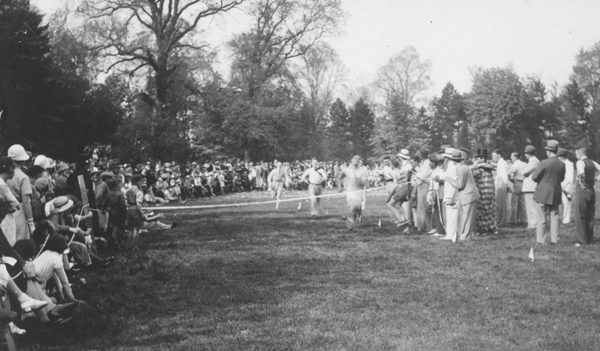
THE WINNERS.
The following is a detailed list of the prize-winners:-
CHILDREN’S EVENTS.
Flat race (girls 6 to 8)- 1, Marion Walker; 2, Joy Keedle; 3, Daphne Bennett.
Rabbit race (boys under 6)- 1, John Orme; 2, F. Green; 3, Leslie Norman.
Relay race (boys 12 to 14)- 1, R. Stonell’s team; 2nd, E. Odell’s team.
Egg and spoon race (girls 10-12)- 1, B. Puryer; 2, F. Page; 3, Elizabeth Hawley.
3-legged race (boys 10-12)- 1, John Cox and John Drinkwater; 2, R. Forster and E. Brazier; 3, P. Chilver and Keith Neal.
Flat race (girls under 6)- 1, B. French; 2, M. Austin; 3, B. Gibbard.
Sack race (boys 8-10)-1, J. Waters; 2nd, Gordon Green; 3, B. Holdrick.
Flat race (girls 14 to 16)- 1, Joan Beckett; 2, J. Norman; 3, Joan Illing.
Flat race 100 yards (boys 14 to 16)- 1, J. Viccars; 2, R. Hawkins; 3, T. Adkins.
Egg and spoon race (girls 12-14)- 1, M. Smith; 2, E. Turner; 3, Joan Illing.
Steeplechase (boys 6-8, final)- 1, S. Bennett; 2, D. Odell; 3, A. Gurnett.
Hopping race (girls 8-10, final)- 1, M. Pottier; 2, Marion Walker; equal 3, M. Macdonald and D. Austin.
Potato race (boys under 14)- 1, E. Odell; 2, R. Stonell; 3, M. Keys.
Potato race (girls under 14)- 1, E. Turner; 2, P. Dobbs; equal 3, J. Axton and M. Walker.
SENIOR EVENTS.
Egg and spoon race (women)- 1, Mrs. Alderman; 2, Miss Spatcher; 3, Miss Wiggins.
Sack race (men, final)- 1, B. Holt; 2, E. Hancock; 3, R. Waters.
Relay race (men)- 1, J. Shapland’s team; 2, J. Ingram’s team.
3-legged race (men and women, final)- 1, Miss Kirby and F. Kirby; 2, Miss F. Turner and G. Hawkins; 3, Miss S. Forster and R. O. Langley.
Jubilee championship 100 yards flat race (scratch men)- 1, R. Hillesdon; 2, R. Topping; 3, B. Kerrison.
Relay race (teams 2 men, 2 women)- 1, Miss Spatcher, Miss Dobbs, R. O. Langley, E. Hancock.
Band race- 1, Drummer S. Fowler; 2, Bandsman E. Fowler; 3, Bandsman H. Slade.
Committee race, 100 yards- 1, J. Ingram; equal 2, F. S. Young and B. Woodman; 3, B. Kerrison.
Tug-of-war (final)- Cricket Club beat Chamber of Trade, by 2 pulls to 1.
Walking race (men over 40, handicap)- 1, the Hon. Francis Hubbard; 2, G. Gaylor; 3, G. H. Beckett.
Jubilee half mile- 1, B. Kerrison; 2, R. Hillesdon; 3, G. Hawkins.
OLD AND YOUNG ENTERTAINED.
The Odd Fellows’ Hall, beautifully adorned by the Jubilee Dance Committee, with paper decorations suggestive of rippling cascades of colour, was the scene of happy meetings of young and old. Close upon 150 old people of Winslow were entertained to a splendid luncheon, some of them being conveyed to the hall by cars.
Children of Winslow later enjoyed an excellent tea, accompanied by a conjuring entertainment. Jubilee mugs were given and presented to them by Mrs. Norman McCorquodale. Mr. Higgs was Chairman of the Committee responsible and Miss Lambton and Mrs. Higgs and helpers effectively decorated the tables. Grace was said by the Vicar of Winslow and the Free Church Ministers…
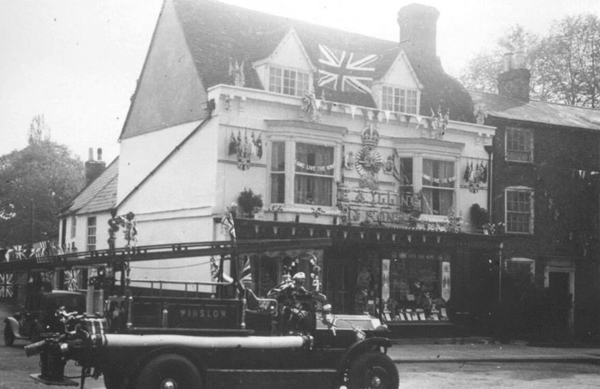
The Pageant
WINSLOW MAKES HISTORY
Brilliant Pageant in Market Square
LOCAL AUTHOR, PRODUCER AND PAGEANTEERS.
Winslow Market Square provided the ideal setting for the production in the evening of Silver Jubilee Day of a Pageant describing, in three episodes a chapter in local history. Written and produced by Mrs. Kenneth Robson, of Winslow, the pageant depicted His Majesty King Henry III granting the Market Charter to the Lord of the Manor of Winslow, the Lord Abbot of St. Albans in 1235 and the fifty or more pageanteers taking part were well-known local residents.
It was a day when the mind readily gave itself to the contemplation of historical romance and regal beneficence and having honoured by thanksgiving and merriment throughout the day, a great national event of the present time, the residents of Winslow happily settled down in the evening of Jubilee day to the spectacle of a chapter of their own town’s history, of exactly 700 years ago, taking animated shape before them.
A BEAUTIFUL SETTING.
No better aid to realism could have been found for the Pageant than the characteristic picturesque, market square of this country town, with stolid tall buildings and hospitable looking inns, all nobly dressed in a lavish gaiety of flags and bunting, enclosing the stone square stage of the pageanteers. An ornamental tree represented a clever and effective piece of transformation.
Hundreds of spectators lined the edge of the Market Square and the space behind, the earliest comers occupying the chairs which had been provided around the whole area and many others standing behind. Every window overlooking the Square framed its half dozen or more pairs of watching eyes and the vantage point of tall roofs were gained by some of the spectators who stood silhouetted against chimney stacks. The audience included many visitors from neighbouring places.
The westering sun of a perfect Jubilee day gave glamorous light to the colourful costumes and dresses of the villeins and women-folk who were the first of the pageanteers to make their appearance on the square, sharp on the conclusion of the preliminary announcements by Mr. G. T. Bennett, Chairman of the Jubilee Committee.
MERRY VILLEINS.
We commend these jovial farming folk for the heartiness of the “lead-off” which they gave to the opening episode. Meeting in the country town, they were heard discussing the disposal of bumper crops and the speechmakers of the company present set forth their dialogue in convincing style. Gathered also with them were women folk- some of them with baskets of lush meadow cowslips- and children playing with bat and ball. The ensemble was charmingly effective and all entered with esprit de corps into a vivid portrayal.
A market having suggested itself, the episode goes on to depict the arrival of the Abbot’s Chamberlain who is passing through, and who approving of this suggestion, sends a messenger to the Lord of the Manor, the Abbot of St. Albans who is resting at his country residence at Aston Abbotts. The words of the Abbot’s Chamberlain, an effectively dressed figure, Master Robert Ounesby, were admirably spoken by Mr. Dennis Smith. One of the jolliest features of this episode was the call of the villeins for “Pretty Polly” (vivaciously characterised by Miss S. Ingram) who introduced a touch of “local colour” by making a swift course for the Winslow “Bell” and emerging therefrom with jugs and tankards of ale which were heartily dispensed to the jovial countrymen. The ale, a footnote to the programme announced, was the gift of the Aylesbury Brewery Company, Ltd.
The villeins were characterised by Messrs. J. S. Goss, W. G. Chowles, G. Ingram, R. Fulks, B. Woodman, W. G. Chowles Jnr., R. J. Chowles, F. Gibbard, G. French, G. Beckett and J. Ingram, and the women-folk by Mrs. D. Smith and the Misses A. E. Mathews, S. Shergold, O. Lowe, N. Saunders and P. Smith. Mrs. Haines made an effective appearance as Mistress Robert Ounesby and Margaret and Alison MacDonald as the two children. Children who gave vivacious plays to the crowd scene were M. Smith, P. Midgley, E. Hawley, Daphne Bennett, Richard Bennett and Joe Liddington.
Sir Kenneth Macdonald, of Winslow, made an impressive appearance as the Abbot of St. Albans in the second episode in which a procession of black-hooded monks, chanting, was one of the features. This episode depicted the announcement to the villeins that the Lord Abbot and his monks are on their way to Biggin and the arrival of the Abbot who tells of the immediate coming of King Henry III who is hunting deer with the Earl of Arundel in Whaddon forests. The priors were represented by Mr. A. Rolfe and Mr. W. Saunders and the monks by Messrs. R. J. Haines, G. H. Thompson, D. Lowe, E. Illing, R. Langley, G. Newham.
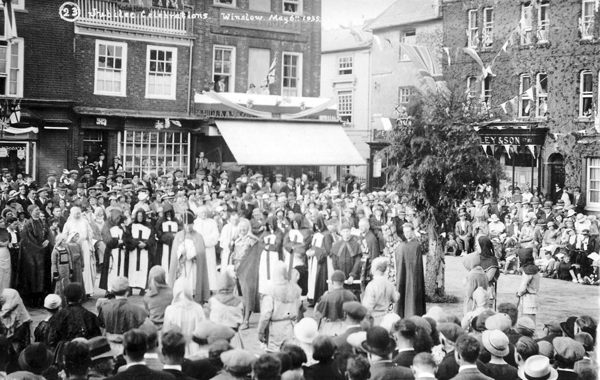
PAGEANTRY OF HORSEMANSHIP.
King Henry the Third, splendidly clad (and well portrayed by Mr. K. J. Robson) entered the square with attendants, on a white horse at the close of the final episode in which a messenger (Mr. G. Goss) who had “run from Swanbourne,” heralded, in dramatic style, the King's arrival and in which the granting of the Market Charter to the Lord Abbot was depicted to the accompaniment of convincing and stately ceremony. The King, in a speech, referred appreciatively to the loyalty of the people and to the good hunting of the country. He arrived in a vivid moment, the picturesque character of which was enhanced by the pageantry of horsemanship, accompanied by the Earl of Arundel (Mr. P. Hazelton), Page (Master S. Macdonald), Steward (Mr. P. Hawley), Groom (Mr. S. Viccars), Archers (Mr. H. Kerrison and Mr. J. Hobbs), soldiers (Mr. R. Hobbs and Mr. T. Adkins), with a court jester (Mr. T. Carter) well to the fore in a pose of jollity, enthroned on a donkey. After the ceremony, His Majesty left the square to the accompaniment of the cheers of the crowd, leaving on the minds of the spectators, a vivid impression of an event in which the King had touched the hearts of the folk of their own neighbourhood, seven hundred years before the Jubilee Day of George the Fifth.
The triumphant success of the production was due in part to the effective dialogue of Mrs. Robson, who is to be heartily congratulated upon this and upon her skilful work as producer. To have obtained the result achieved, she had evidently devoted herself to considerable research and great efforts had been made to conform as far as possible with the circumstantial traditions relating to the event depicted. Possibly from the point of view of some of the members of the audience, the words would have been more easily audible had the direction of the speaking varied more; but faced with the considerable difficulties of an open air performance in an extensive area, the pageanteers succeeded in bringing their true story very effectively home to all the spectators. We cannot praise too highly their splendid esprit de corps and sense of the requirements of the production.
MAYPOLE DANCING FOLLOWS.
All but merging with the closing plaudits of the villeins, Maypole dancing by Winslow children on the Market Square, gave the perfect finale to the revival of the spirit if the past. Again in a beautiful setting, those white-clad happy children brought the echo of Merrie England to the country Market Square, as they gave praiseworthy demonstrations of varying dance figures around the gaily be-ribboned pole, one of the prettiest effects being created by the final plait. Folk dancing followed, all the music being provided by gramophone records. The children had been trained by Miss Charteris and assistants.
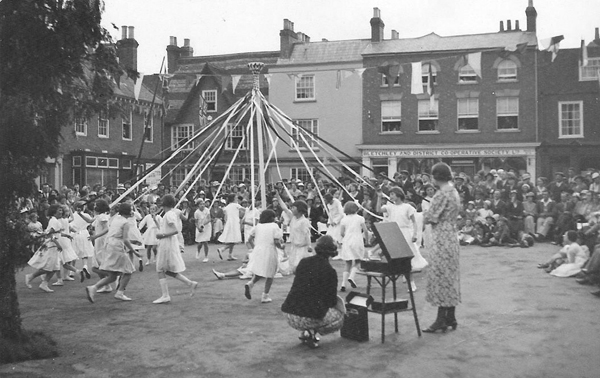
MOCK BULL FIGHT.
A comedy “surprise” followed in the form of a comic bull-fight, with Mr. “Mac” Hancock as Toreador and Mr. E. Byford and Mr. R. Langley as the savage beast. After the contest the bull “Horace” was offered for auction by Mr. D. Smith of the firm of Messrs. Wigley and Sons. 5s. was offered and “Horace” registering his disapproval revealed his identity to the laughing crowd.
WINSLOW’S NIGHT OF BRIGHTNESS
Torchlight procession to bonfire
(by our special correspondent.)
It was about 9.30 when I arrived in Winslow to find this usually quiet market town thronged with people and brilliantly illuminated. Driving along the High Street I was first impressed by the brightness of the Poor Law Institution, the gateway arch being surmounted with coloured fairy lamps, a giant paper crown completing the effect.
Continuing, the next mare of coloured lights was on premises adjacent to the scene of Winslow’s recent memorable fire.
The floodlit War Memorial made a strong appeal from a long way off. With the Church of St. Laurence as a dignified background, one paused awhile and allowed the train of thought to wander back to those dark and heroic days- the years 1914-1918- of his Majesty’s reign.
Straight ahead, the “floodlit Bell,” with its white front, made an imposing landmark. Circling around the Market Square before proceeding to Dene Hill, I had just taken my eyes from the fairy lamps outlining Lloyds Bank when automatically I was magnetised by the remarkable effect of the floodlights of Messrs. Hawley’s building, the shop windows of which, brilliantly illuminated, were exhibiting a well-known commodity, with red, white and blue labels. The flags and bunting extending to the peak of the roof, and fluttering in the breeze, cast queer shadows upon the creeper which, adorning the whole frontage, appeared as one mass of rippling silver leaves.
In order to obtain the most spectacular view of the approaching torchlight procession, I parked my car at the hill top facing the schools in Sheep Street. Soon, through the stillness of the perfect night, came the sound of a band’s marching music. The procession was on its way.
Louder and louder the music sounded, until, at the foot of the hill as it passed Winslow Hall, the lights of nearly a hundred torches looked like a myriad tongues of hungry fire, eager in anticipation of kindling the giant bonfire.
The shouting and singing of the marchers, the hooting of motor horns, the clanging of the Fire Engine bell, together with the band’s music, made lively discord but harmonious rejoicing.
The Fire Brigade spangled with coloured electric lights, together with the gleam of the firemen’s helmets, added the desired effect for Winslow’s gayest carnival.
Assembling on Dene Hill, the throng surrounded the giant bonfire. Soon it was kindled and as it grew into a mighty inferno, rockets, shooting up from all angles, shed their brilliant stars and seemed to give the signal for the band to lead in a volume of community singing.
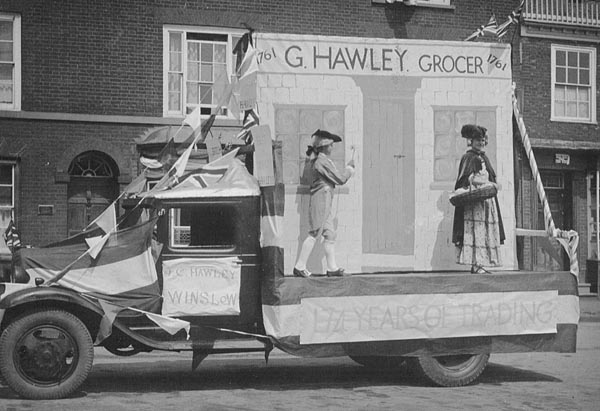
See also:
